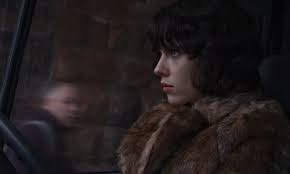Under the Skin (2013) is a film that divides
opinion. When friends heard that I intended to go and see it they, variously,
told me that it was: “A breakthrough in cinema” “The most disturbing film ever”
“Misogynistic” “Remeniscent of Kubrick” and “Unimaginably boring”. Could all these
descriptions be true?
Phoenix Square in Leicester was showing it
yesterday, so I went along to find out.
Under the Skin is a film about... Well, here I run
into my first problem. Nothing is obvious. Even by the end, I couldn’t tell you
definitively what the story is. We watch as Scarlett Johansson, clothed in a
stolen identity, drives around Glasgow at night. In turn, she watches the people
on the streets around her. Sometimes she stops and talks to one of them. Sometimes
she offers a lift. And all the time, we, the audience, are playing detective,
trying to find a story behind these apparently random interactions.
 |
| Scarlett Johansson - Under the Skin |
Anyone who has seen the trailer will already know
that a disturbing fate awaits a man, enticed by her sexuality to enter a
surreal black, featureless lair. Then we are back to driving around and
watching.
The shots are cut long, giving the film a deliberately
slow pace. The camera lingers over everything. And without a clear thread of
story to hold onto, the pace feels doubly slow. For many people, it has clearly
crossed the fine line that separates ‘enigmatic’ from ‘boring’. And yes, I can
see that point of view.
Several things kept me on the enigmatic side of
the line. First and foremost was Scarlett Johansson’s presence. Her face is endlessly
fascinating in passivity. And her abrupt switches to other modes of expression
were disturbing and entirely believable. I hope her performance is not
overlooked when the awards season comes around again.
The second reason the film had me hooked were
the occasional surreal scenes, which seemed to take place in another reality.
They were visually extraordinary. I have not read the book, but it would be
very interesting to know what these are the visual representation of in prose. They
are certainly a triumph in film making and it is in them that the Kubrick
comparison felt most meaningful.
The third reason I stayed with the film was the
naturalistic acting style, at least part of which came from hidden camera
filming of ordinary people going about their lives. This dissolving of the wall
between documentary and fiction did much to heighten the disturbing effect of
the film overall. When something bad happens, it feels as if we are watching
reality.
I have to address the suggestion of misogyny,
which almost put me off going to see the film. I can understand that a story
about a woman stalking male victims might be seen as such. But I did not take
it that way. For me the character played by Johansson, though presenting female
sexuality, was in fact alien from the concept herself. Thus, ironically, her
true character seemed androgynous.
However an interaction between a male and a female
character at the end of the film – which I can’t describe because it would be a
significant spoiler – did leave me very uneasy in this respect. It left issues
unresolved – which I think was the intention of the film makers, but
which I can imagine it receiving criticism for. It is a fine judgement, but I
think that sequence was justified by the story.
Under the Skin is not a film for everyone. Hurrah
for that! The astronomical cost of film making naturally pushes producers to
try to satisfy the largest possible audience. That isn't a complaint. It is
just economic fact. But the net effect of a million economically necessary
decisions is to make the film industry institutionally conservative and risk
averse.
Here we have a notable exception. Congratulations
to all the funders for getting behind it. And to Scarlett Johansson for taking
the risk.
Yes, Under the Skin gets a thumbs up from me. But it leaves me with a question - are a strong story thread and this kind of quality mutually exclusive? In other words - good as it was, could this film have been better?



